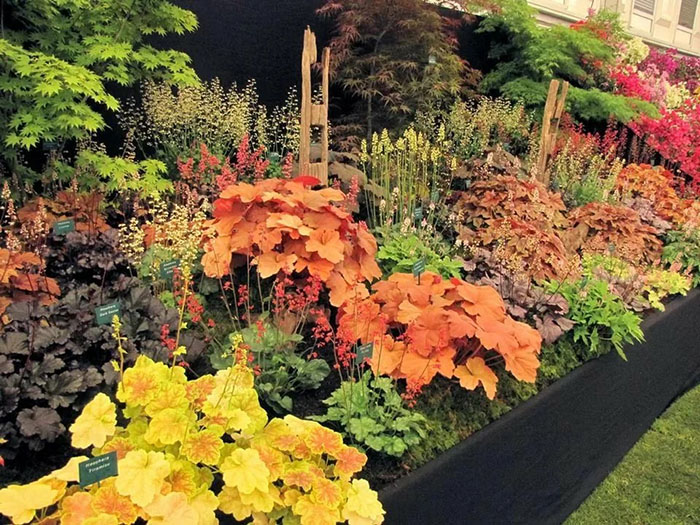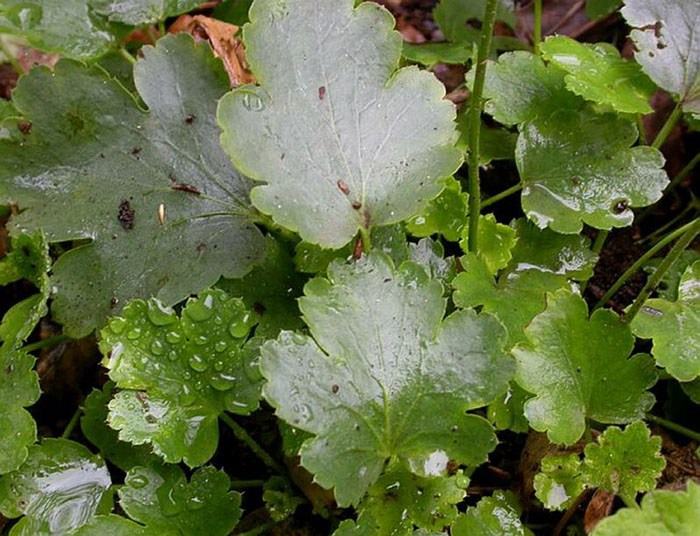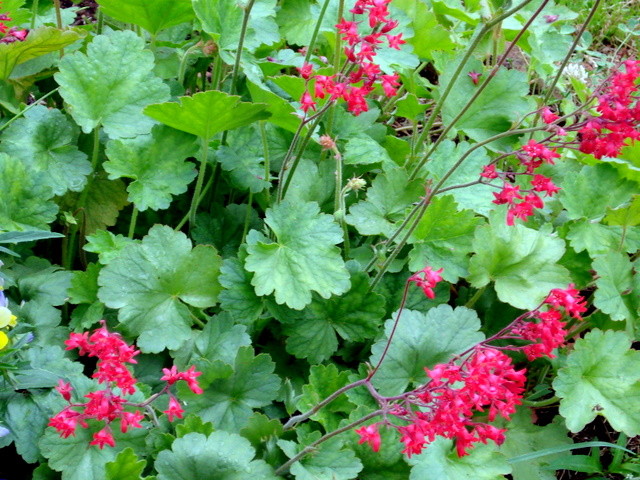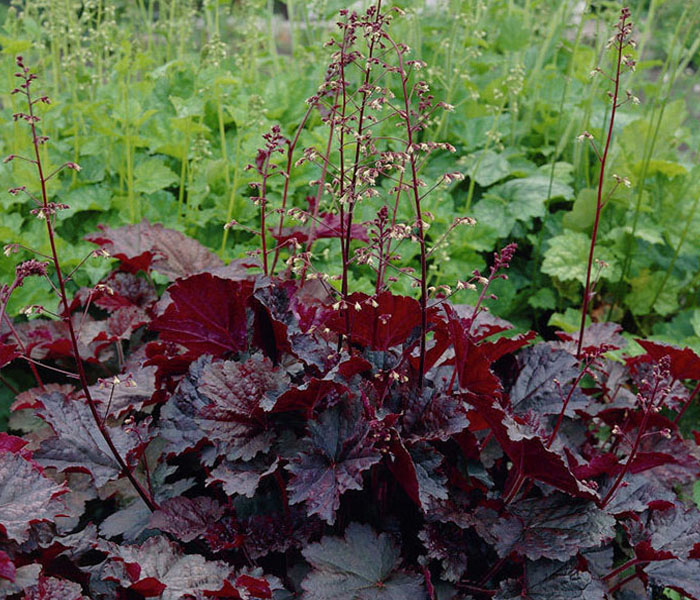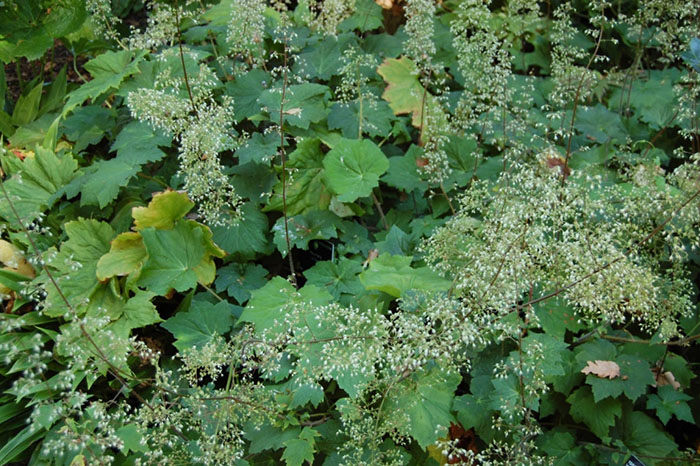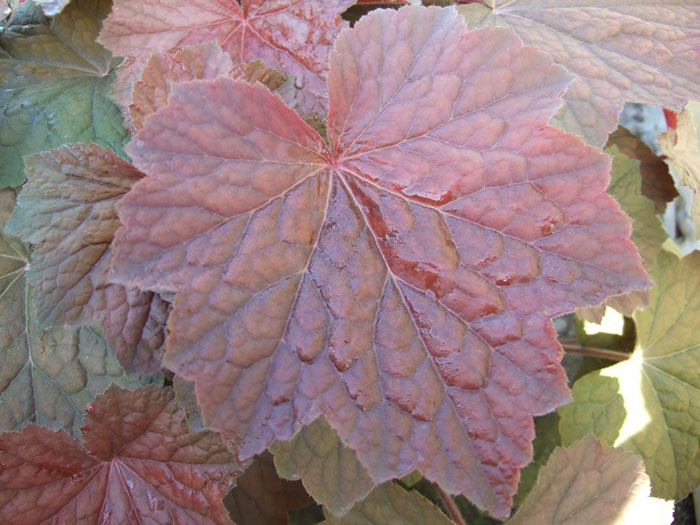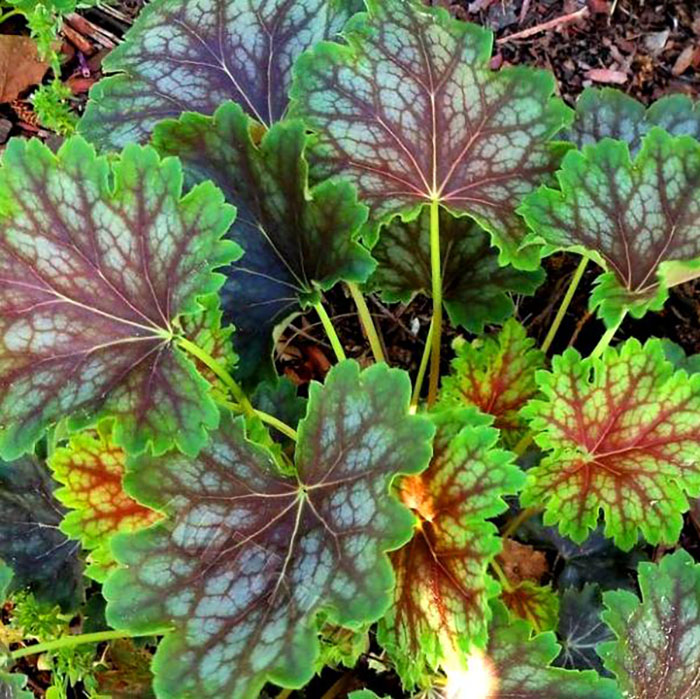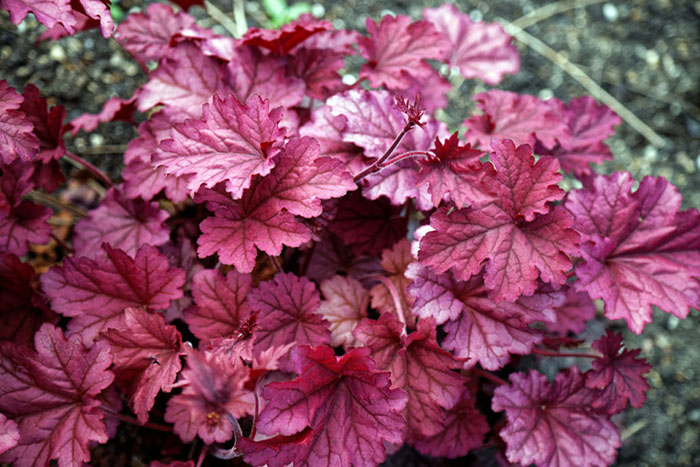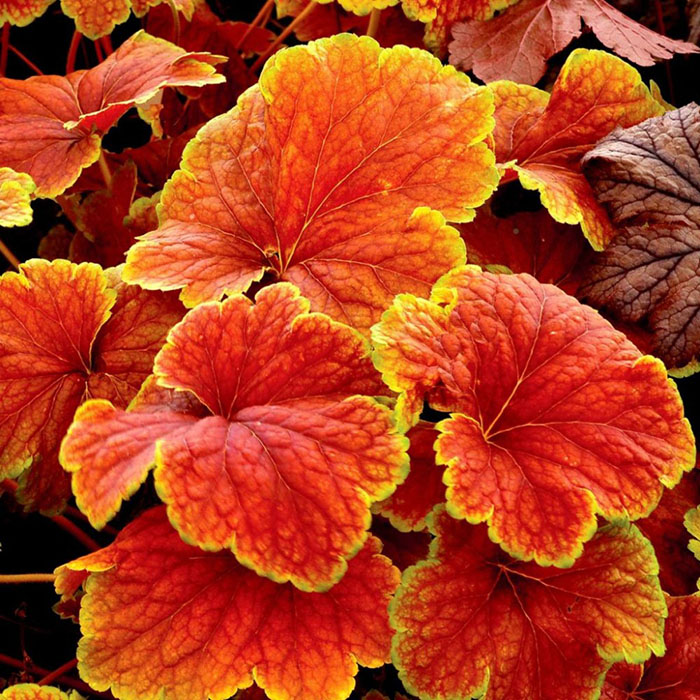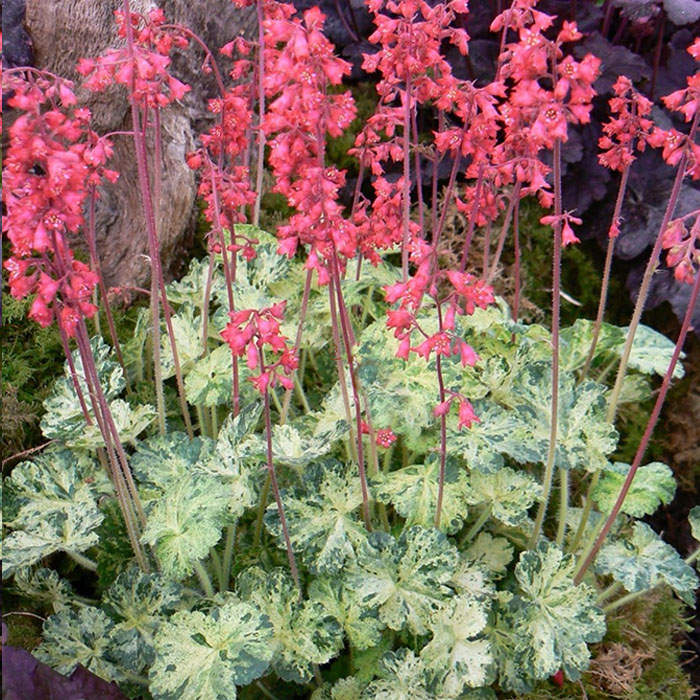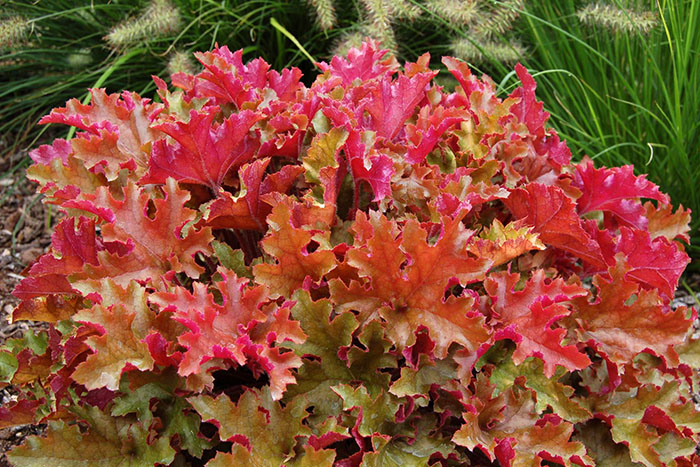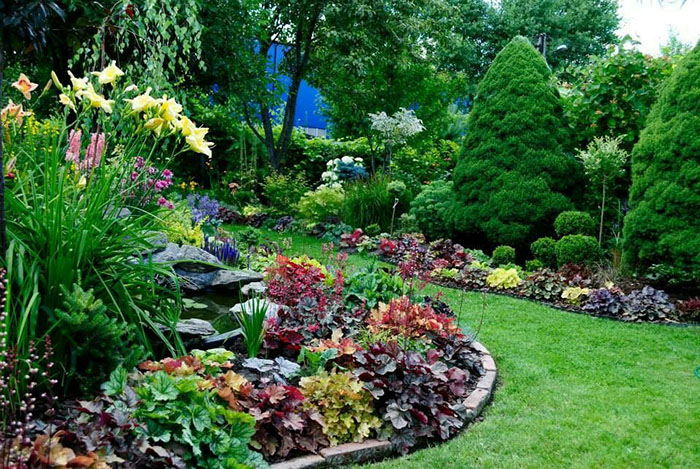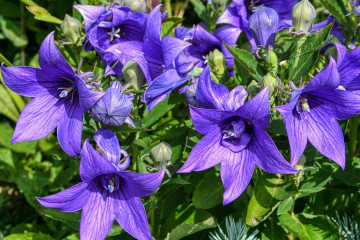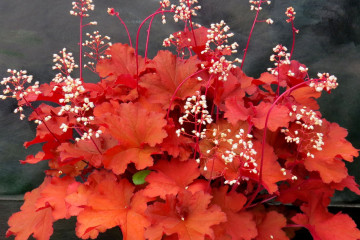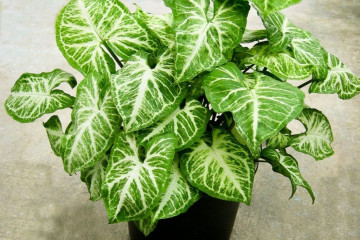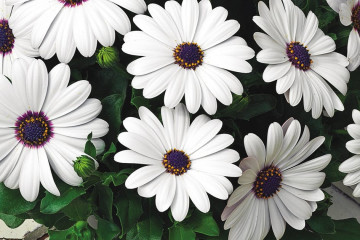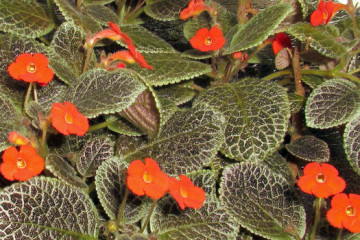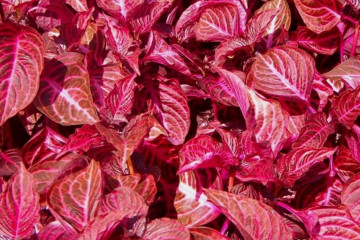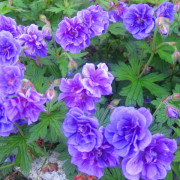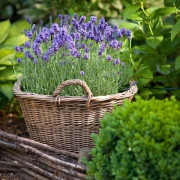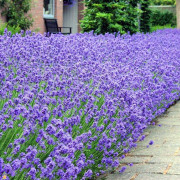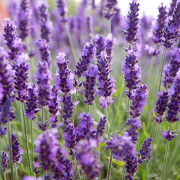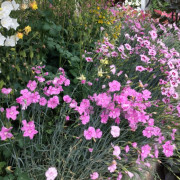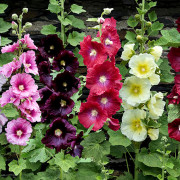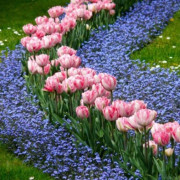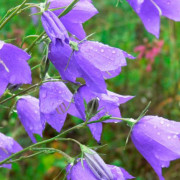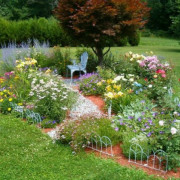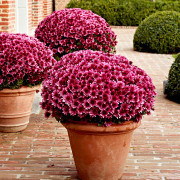Heuchera flower: varieties
Heuchera is a low-growing (up to 60 cm) perennial plant with spectacular toothed leaves collected in a rosette. Their size and color are diverse, which makes it possible to use the plant for decorating rabatki, alpine slides and other flower arrangements.
Most popular varieties
As a result of complex crosses, such a variety of impressive varieties was obtained that even the owners of impressive collections of Heucher find it difficult to refrain from buying a new item.
Plants grow rapidly, forming clumps. In summer, small flowers bloom on thin peduncles. However, foliage gives these plants a special charm. What color shades and combinations are not there! Bright orange Heuchera Paprika, Obsidian variety with dense dark purple foliage, amber Heychera Caramel, reminiscent of caramel in color, and Suga Frosting, a soft plum-colored Heuchera with a silvery sheen.
Gooseberry (Heuchera grossulariifolia)
One of the most unpretentious species is gooseberry-leaved heuchera. Her leaves are green, with a peculiar shape. The flowers are white, rather large.
Blood red (Heuchera sanguinea)
A perennial plant with green wintering leaves is named after the color of the inflorescences. In summer, red and red-pink graceful flowers bloom over the green rosettes, effectively contrasting with the foliage. Flowering continues until autumn, and the foliage does not lose its decorative effect even with the onset of cold weather.
A popular variety of this plant species is Robusta. It tolerates both cold and heat well. His flowers are red. Green leaves also acquire a red tint over time.
Small-flowered, or Heuchera micrantha (Heuchera micrantha)
The shape of the leaves of this small-flowered heuchera is similar to the leaves of the Norway maple. Some varieties have pubescent shoots. Peduncles are tall, up to 70 cm. Miniature flowers of white, pink or red color.
For garden decoration, the variety Palace Purple is often used. Large leaves of Heuchera Palace Purpl are carved, maroon. The lower part of the leaf plate is burgundy. In the heat, the color brightens. Small creamy white inflorescences form light clouds against a background of dark foliage. The variety is characterized by high frost resistance.
Cylindrical (Heuchera cylindrica)
This unpretentious species is able to survive in the harsh conditions of the highlands. Its leaves are heart-shaped-rounded, green, with prominent veins. The flowers are pink, red, beige or green, they are collected in cylindrical inflorescences.
Popular varieties of this species include Green Ivory with dark green leaves and creamy buds and Greenfinc with bright red flowers. The plant prefers a well-lit area.
Hairy (Heuchera villosa)
This species is hygrophilous, prefers sunny areas. Leaves of heuchera hairy are large, pointed, velvety. Not only leaf plates are pubescent, but also peduncles and petioles.
Brownies, a dark variety of this species, retain their chocolate hue throughout the season. White-pink fluffy inflorescences add decorativeness to it.
American (Heuchera Americana)
The fragrant flowers of this heuchera are yellow-green in color and are gathered in a panicle.Large jagged green leaves are adorned with dark veins, spots and stains.
A spectacular representative of the species is Marvelous Marble - a variety with a powerful rhizome and extremely decorative leaves. His rosette is silvery-green with brown-violet marble streaks. In spring, violet color predominates on the leaf plates, and green in summer. The serrated edge of the leaf is framed with a green border.
Hybrid (Heuchera hybrida)
This group is most actively used in landscaping. It includes hybrids obtained from crossing various species. Their colors and shapes amaze the imagination and provide ample opportunities for creating garden compositions. The most popular varieties of this type are considered below.
Geyher Berry Smoothie (Berry Smoothie). A large (up to 45 cm) rosette of the Berry Smoothie variety is dense, neat. Leaves with pronounced veins change color during the season. No wonder the plant was given the name Berry Cocktail - in the spring the bush acquires a raspberry hue, and in the fall, violet-blackberry notes are added. In spring, small flowers are formed on peduncles 55 cm high. The bush grows quickly. The plant can withstand frost down to -35 ° C.
Geykhera Midnight Rose Select (Midnight rose Select). Raspberry-speckled chocolate leaves are the hallmark of Midnight Rose. The bush is compact and bright. The flowers are pink.
Ring of Fire is a hybrid with carved multicolored leaves. Adult leaf plates are green, with a silvery tinge, burgundy-red veins. Young coral growth with dark venation. In autumn, a pink border appears along the edge of the leaf. The result is an unusual visual effect, thanks to which the variety is named "Ring of Fire".
The leaves of the Delta Don hybrid are brick-colored with a bright lemon edging. In summer, sunny yellow shades prevail on the flower, and by autumn the leaves turn red. Small creamy flowers only set off the catchy foliage.
The Heuchera flower Zipper surprises with its rich palette. On the glossy corrugated leaves, there are overflows from golden caramel to purple, and the reverse side of the leaf plate is pink.
Electra - Heuchera with lemon yellow foliage and red venation. Lush rosette, 40 cm high.
The variegated Galaxy Galaxy is distinguished by leathery leaves with bright pink spots. The basic color of the leaf changes from red to dark brown.
On the green leaves of the Hercules variety, variegated creamy white blotches. Lacy inflorescences are bright red.
Heuchera of the Peach Flambe variety changes the color of the leaves several times per season. In the spring it is bright orange, with a reddish tint, in the summer it is lighter, peachy, and in the fall the bush darkens.
Hybrid Amethyst Mist lilac-burgundy color. Its leaves are serrated, with a silvery haze. Inflorescences are cream.
Geyhera Marmalade (Lime Marmalade) combines green, yellow and orange shades. The pronounced corrugated edge of the sheet plate gives a special decorative effect to the Lime Marmalade Heuchera, thanks to which the “marmalade” rosette looks lacy and airy.
Close relatives of Heucher are Heycherells, which are distinguished by more compact rosettes and low peduncles. Popular Heycherell varieties include Golden Zebra with carved yellow leaves and red veins, bright green Tapestri (a hybrid of Heuchera and tiarella) with purple veins, Miniature Stoplight with a dark pattern on yellow-green leaves, and fiery orange Sweet Tee.A description of Heucherell would be incomplete without mentioning the fast-growing Fire Frost variety, which resembles Heuchera with large lettuce-colored leaves, and Solar Powers with reddish-brown strokes on a yellow background.
Color harmony in landscape design
Perennial plants of the Saxifrage family are widely used in landscape design. Unpretentious bushes of stunning colors retain their decorative effect throughout the season. A spectacular decoration of the garden is compositions consisting of different colors of Heuchera. Combinations of heuchera with other plants are no less wonderful.
Red-leaved varieties are successfully combined with silvery cineraria and wormwood. Heucheras with dark leaves set off blooming irises and daylilies. Instances with bright foliage form spectacular islands on the emerald lawn.
In complex flower beds, Heuchera will become a good companion for other light-loving perennials, for example, roses, clematis or geraniums. Usually heuchera is planted in the foreground of a flower arrangement. Varieties with variegated leaves will create bright accents, sitting among stones in rockeries and alpine hills. They look organic and in the curb along the paths.
Growing problems
Geyhera care is simple. It withstands high and low temperatures, light shading and bright sun and is undemanding to the soil. Reproduction by dividing the bush allows you to quickly get several copies and distribute them over the site.
The main problem faced when growing this plant is root rot, which occurs due to stagnant water. To prevent it, the soil is well drained by adding a baking powder (sand or perlite).
With high humidity, fungal diseases such as powdery mildew and rust can appear on the leaves. Affected specimens are treated with fungicides.
Among insect pests, whiteflies, furrowed weevils and white leafhoppers are dangerous. They are disposed of with insecticides.
Heucheras blend harmoniously into any flower arrangement, diluting the landscape with bright colors. Expressive compact bushes of the plant are able to fill empty spaces in the flower bed, connecting all the plants into a harmonious group. An unpretentious bright flower will delight the eye for many years.
